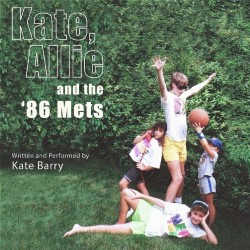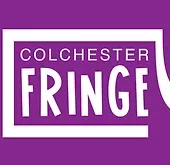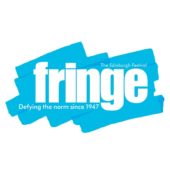
From a Crichton Street bench next to Appleton Tower, Kate Barry speaks to Erin Williamson about her show Kate, Allie and the ’86 Mets (running at Gilded Balloon @ Appleton Tower until the 24th of August). The show received a Hidden Gem rating from Fringe Review. Here we chat about Kate’s story and how she worked out how to tell it, her first Fringe experience this year, and going from the editing suite to the stage.
Book tickets: https://www.edfringe.com/tickets/whats-on/kate-allie-and-the-86-mets
Kate Barry… On Kate, Allie and the ‘86 Mets: The show is a true story. It is based on my two moms, when I was eight years old, my mom and her best friend, Dorothy. They were both divorced and were looking for a solution to single motherhood. So they moved me, my little brother and Dorothy’s two kids all together into one house, embraced us all together. And two years ago, I found out that actually it was not just like a convenient thing for two moms. It was love all along.
I’d always thought about this story and the conversations that I had, and my siblings had, and the perception of their relationship, and also the verbiage around it – calling themselves best friends or housemates, or at one point, partners … and I didn’t know. I knew I wanted to tell the story. At the time I didn’t know how I would tell that story or what I would do with it, but it felt like I wanted to do it. And also that it was important, because there’s a lot of reasons that they weren’t able to tell us, or didn’t feel comfortable telling us, and how that all evolved over the years. Why weren’t they telling us everything? Why weren’t they coming out with that? I think that’s important, especially today, for younger generations. If, you know, we might go back to a time where people don’t feel comfortable. I think we may, in some ways, already be there. So yeah, I felt that it was important to understand what that does to not just them as a couple, but to their family.
On storytelling: I didn’t know what storytelling was! I was taking a class during the pandemic, actually, maybe 2021 on Zoom at the Irish Arts Centre in New York. And I thought it was a writing class. And so then I get on the Zoom, and it’s me and a bunch of retirees, and he’s like, “okay, tell us this three minute story”. What the hell are you talking about? Tell you a three minute story? And even to the point that a year later, he, my teacher, Brad Lawrence (who’s won The Moth like, multiple times, and he’s amazing). He’s like” you’ve got 10 minutes in New York when you’re ready for it”. No way, I’m not doing that. And even then I said, “What do I send? Like, an outline?” “No, Kate, you send a video of you telling the story”. So it took me a while to understand, really. But through that class is how this all came about. I told “The Story of the Summer of 1986” and he said, “that’s a one hour show”.
I started thinking of different scenes in which my mom and I spoke about it, or I questioned it, or my siblings and I talked about it. And so each class, I would just do a new scene. And what I found as a device that was really helpful (and I use a lot in documentary, film-making, editing, and story structure) is the use of flashback. It’s helpful for me in the storytelling, but it’s also really helpful for me on stage, because it’s not scripted. I’m not an actor, so the idea of memorising my lines was really terrifying to me. So it is slightly different each time. And sometimes I do actually forget a scene, and I’ll get to a photo and I’ll be like, oh shit. And then I’ll re bring in a scene as a flashback, and that’s and then sometimes when I do that, friends of mine who’ve seen the show multiple times to be like that actually worked better, and so we’ve kept it as a flashback, or we’ve kept it as a revelation or a conversation.
The structure of being able to move the pieces around is very helpful to me, because it’s how I tell stories in an edit room, and that enables me to be much more comfortable also on stage, because I know I can always pivot. And also it’s kind of exciting too. My brother started Improv and he always says, once you’ve done something, you want to do it again. And it keeps it interesting for me, because I can play around with the chronological order. What I find difficult about the writing of this, and also the storytelling, is the tense. Sometimes the flashback allows me to tell it in a past tense with perception and revelation – other stories can be current and moving forward in the present tense – but that was very tricky. I found, when I was writing, the problem was I was writing in the past tense, and so when I tried to tell the story it felt like I was reading something, so I had to change that point of view. We work with it all the time in the edit room as well, in film-making and documentary, and I think it’s something in interviews we do a lot too, because people will be telling their story, but then they’ll be talking about something that happened in the past, and they’re talking about it from that point of view. So I had to really think about that- when am I telling a story, from that moment, in that age that I was then, and when am I telling it as a flashback? Because we need the point of view and the revelation. And so that is more about, how does the story serve my arc as a character? And yeah, that’s been really interesting to play with.
On live performance: When I thought about all the stressful things leading up to Fringe, I just focused on being in the room with audiences, and I think that’s why I’m here, because I actually really love that. And I think what a privilege to be able to do that. I mean, have someone sit and listen to your story for an hour. I mean, that’s incredible, you know, that’s really amazing. And to have them connect on that rather than, you know, seeing on social media from a film or a TV show that I’ve done.
On telling stories with care: I started my career at HBO, and these are the most loving, respectful filmmakers and executives. I was very, very, very lucky in my training and my life in documentary to start with that. Then working with Liz Garbus and Dan Hogan and Jon Barden, myself at Story Syndicate, that was a huge focus for us – how do we tell these stories in a way that respects the people who have gifted us the trust to tell their stories? I feel that we put that at the forefront because we had trust in ourselves to make something that was entertaining, that was going to get very good ratings, that was going to connect to the world in a way that sometimes documentaries don’t get an opportunity to. We trusted that we were going to tell a great story and still protect the things to them that maybe they didn’t want to reveal, or help them reveal something that might have been scary for them, and do it in a really beautiful way.
So with my mom and Dorothy, I asked them. I knew the things to tell them and when to tell them, so that they felt prepared, in control, supported. I said, if you don’t want me to tell it, I won’t do it. There are a lot of things in the show that I don’t go into details on or I don’t elaborate on because I can still make the show entertaining, and I can still make the themes land, and I can still connect with an audience, and I can still get that same point across without divulging certain things that either I feel people wouldn’t want known, wouldn’t want to be public, or I just feel that it’s not necessary. Yeah, and I think I learned that line through all these years of storytelling
I’d rather have something that people feel really proud of, and are proud of their participation and leads to great things, then feel like I have to use something salacious, because if I’m doing that, I’m failing, then I haven’t figured out how to tell the story in the right way. There are certain things you can’t leave out because the story doesn’t make sense without them, but there are other things that you’re using for an emotional reaction, and I think you’re not such a skilled storyteller if you can’t get it another way. I want to be able to tell my own stories, and this is the first thing I’m telling of my own and I want that same respect for everyone who’s allowing me to, you know, tell their stories as well.
(Extracts from interview with Erin Williamson)




























